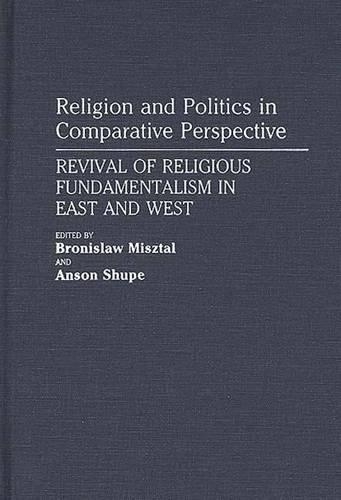
Religion and Politics in Comparative Perspective: Revival of Religious Fundamentalism in East and West
(Hardback)
Publishing Details
Religion and Politics in Comparative Perspective: Revival of Religious Fundamentalism in East and West
By (Author) Bronislaw Misztal
By (author) Anson Shupe
Bloomsbury Publishing PLC
Praeger Publishers Inc
24th November 1992
United States
Classifications
Tertiary Education
Non Fiction
Politics and government
Sociology and anthropology
322
Physical Properties
Hardback
240
Description
This volume proposes that across many cultures, the revival of religious fundamentalism is a response to the globalisation of economies and markets, the weakening of the autonomy of national political sovereignties, and the "corruption" of cultural autonomy, because global information systems are intruding upon regional and ethnic symbolic orders and modes of discourse. Editors Bronislaw Misztal and Anson Shupe bring together theoretical and empirical studies that focus on fundamentalist social movements in North and Central America and Eastern Europe and that examine the role religion plays in determining the direction of social evolution. Each chapter emphasises a common set of processes at work: how religious identities arise or re-emerge to confront the globalisation trend; how various social movements cope with pressures to conform their identities; and how the globalisation trend sets in motion the antithetical reaction of the nationalistic/religious dialectic that it was thought to have eliminated. Part 1 considers the concept of global fundamentalist resurgence and discusses how energetic, even radical, religious movements gradually mellow to accommodate various social institutions they set out to reform or "purify". An analysis of American Christian fundamentalism in its relation to modernity and the production of symbolic capital serves as an example. The chapters in Part II examine fundamentalist religious revivals in previously Eastern bloc countries, paying special attention to Poland, which gained visibility as one of the first nations to challenge the Communist Party's hegemony. Part III explores religious revival in North and Central America, from the new Christian right and its auxiliary, anti-evolution creation/science controversy to Protestant fundamentalism and pacifistic resistance in Latin America. Finally, in Part IV the authors attempt predictions about the role of religion in social movements to come. This book is recommended for sociologists, political scientists, historians and religious studies scholars.
Reviews
.,."this is an interesting book, written by a group of distinguished scholars. Serious students of religion will find the book provocative and can learn much from it."-Perspectives on Political Science
...this is an interesting book, written by a group of distinguished scholars. Serious students of religion will find the book provocative and can learn much from it.-Perspectives on Political Science
This book holds essential reading for scholars with an interest in the global fundamentalist movement, religion's influence on the fall of communism, or the fundamentalist revival in the United States.-Sociology of Religion
..."this is an interesting book, written by a group of distinguished scholars. Serious students of religion will find the book provocative and can learn much from it."-Perspectives on Political Science
"This book holds essential reading for scholars with an interest in the global fundamentalist movement, religion's influence on the fall of communism, or the fundamentalist revival in the United States."-Sociology of Religion
Author Bio
BRONISLAW MISZTAL is Professor of Sociology at Indiana University-Purdue University at Fort Wayne. He is the editor and co-author of Social Movements as a Factor of Change in the Contemporary World and Poland After Solidarity, as well as several books in Polish. ANSON SHUPE is also Professor of Sociology at Indiana University-Purdue University. He is the author of more than 15 books, including the recent Darker Side of Prometheus.
